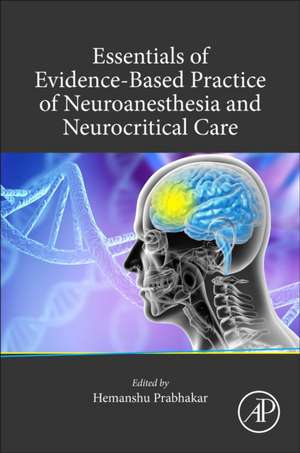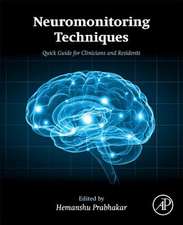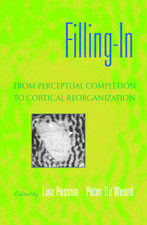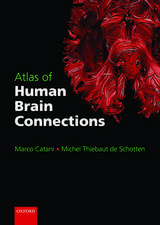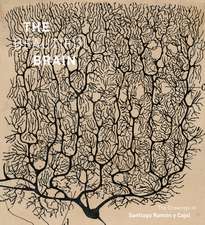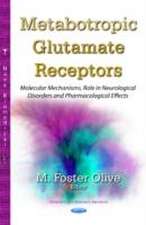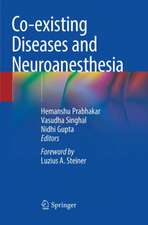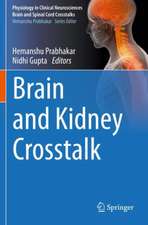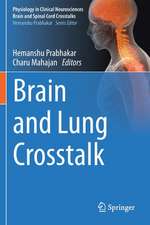Essentials of Evidence-Based Practice of Neuroanesthesia and Neurocritical Care
Editat de Hemanshu Prabhakaren Limba Engleză Paperback – 17 noi 2021
Essentials of Evidence-Based Practice of Neuroanesthesia and Neurocritical Care highlights the various controversies that exist in the practice of neuroanesthesia and provides conclusive evidence-based solutions. This comprehensive resource succinctly discusses evidence-based practice of neuroanesthesia based on systematic reviews in clinical neuroscience research. Topics include neurophysiology: ICP or CPP thresholds; neuropharmacology: intravenous or inhalational anesthetics; and neuromonitoring: ICP monitoring. Evidence-based practice is now an integral part of neuroscience, and this book will help residents and trainees gain knowledge to apply it to their practice.
Endorsements/Reviews:
"Evidence based practice is facilitating changes at a rapid pace in neuroanesthesia and neurocritical care practice. Its practice is exceedingly crucial in neuroanesthesia and neurocritical care considering the criticality of the neurologically sick patients, which leaves little or no room for error for an acceptable outcome in them. Patient management in Neuroanesthesia and neurocritical care has many contentious issues because of rapidly evolving changes in their management which require treatment guided by the latest available evidence in literature. Dr. Hemanshu Prabhakar is a strong proponent of evidence based practice for the management of neurologically ill patients both for surgical procedures and their management in neurointensive care unit. Undoubtedly, this book will be of enormous benefits to the students as well as teachers of neuroanesthesia and neurocritical care sub-specialties." -- Parmod Bithal, Editor-In-Chief, Journal of Neuroanaesthesiology and Critical Care (JNACC)
- Highlights the various controversies that exist in the practice of neuroanesthesia and provides conclusive evidence-based solutions
- Topics include neurophysiology: ICP or CPP thresholds; neuropharmacology: intravenous or inhalational anesthetics; and neuromonitoring: ICP monitoring
- Provides residents and trainees with the knowledge to apply evidence-based practice of neuroanesthesia to their practice
Preț: 702.22 lei
Preț vechi: 909.56 lei
-23% Nou
Puncte Express: 1053
Preț estimativ în valută:
134.39€ • 139.78$ • 110.94£
134.39€ • 139.78$ • 110.94£
Carte tipărită la comandă
Livrare economică 07-21 aprilie
Preluare comenzi: 021 569.72.76
Specificații
ISBN-13: 9780128217764
ISBN-10: 0128217766
Pagini: 460
Dimensiuni: 216 x 276 x 28 mm
Greutate: 1.25 kg
Editura: ELSEVIER SCIENCE
ISBN-10: 0128217766
Pagini: 460
Dimensiuni: 216 x 276 x 28 mm
Greutate: 1.25 kg
Editura: ELSEVIER SCIENCE
Cuprins
Section A - Introduction
1. Introduction to evidence-based practice
Section B - Neurophysiology
2. ICP or CPP thresholds
3. Role of hypothermia
4. Mechanical ventilation—PEEP
Section C - Neuropharmacology
5. Intravenous or inhalational anesthetics?
6. Hyperosmolar therapy
7. Role of nitrous oxide
8. Antimicrobial prophylaxis
9. Role of antiepileptics
10. Treatment of hypertension
11. Role of statins for neuroprotection
12. Role of stem cell therapy in neurosciences
Section D - Neuromonitoring
13. ICP monitoring
14. Type of ICP monitor
15. Newer brain monitoring techniques
16. Intraoperative neuromonitoring
Section E - Neuromonitoring
17. Blood transfusion triggers
18. Reversal of anticoagulation in neurosurgical and neurocritical care settings
19. Role of decompressive craniectomy
20. Strategies for brain protection
21. Anesthesia for carotid endarterectomy
22. Anesthesia for acute stroke
23. Anesthesia for spine surgery
Section F - Neurointensive care
24. Choice of sedation in ICU
25. DVT prophylaxis
26. Role of steroids
27. Initiation of nutrition
28. Glycemic control
29. Anesthetics for status epilepticus
Section G - Ethical issues
30. Diagnosing brain death
Section H - Recent advances
31. Simulations in clinical neurosciences
Section I - Webliography
32. Webliography
1. Introduction to evidence-based practice
Section B - Neurophysiology
2. ICP or CPP thresholds
3. Role of hypothermia
4. Mechanical ventilation—PEEP
Section C - Neuropharmacology
5. Intravenous or inhalational anesthetics?
6. Hyperosmolar therapy
7. Role of nitrous oxide
8. Antimicrobial prophylaxis
9. Role of antiepileptics
10. Treatment of hypertension
11. Role of statins for neuroprotection
12. Role of stem cell therapy in neurosciences
Section D - Neuromonitoring
13. ICP monitoring
14. Type of ICP monitor
15. Newer brain monitoring techniques
16. Intraoperative neuromonitoring
Section E - Neuromonitoring
17. Blood transfusion triggers
18. Reversal of anticoagulation in neurosurgical and neurocritical care settings
19. Role of decompressive craniectomy
20. Strategies for brain protection
21. Anesthesia for carotid endarterectomy
22. Anesthesia for acute stroke
23. Anesthesia for spine surgery
Section F - Neurointensive care
24. Choice of sedation in ICU
25. DVT prophylaxis
26. Role of steroids
27. Initiation of nutrition
28. Glycemic control
29. Anesthetics for status epilepticus
Section G - Ethical issues
30. Diagnosing brain death
Section H - Recent advances
31. Simulations in clinical neurosciences
Section I - Webliography
32. Webliography
Recenzii
"This book is a great addition to the clinical decision making in neuroanesthesiology and neurocritical care, as evidence-based practice continues to reveal its importance in clinical scenarios. This book provides up-to-date evidence in a concise manner, with the help of comparison charts, algorithms, and consensus guidelines, which otherwise would require large amounts of time to cover in the vast literature. This book is unique as it is geared toward answering specific, hard clinical management questions with the most up-to-date evidence for the question or controversy at hand. In a few specific chapters, it is unable to give a strong consensus recommendation due to the lack of evidence currently available, but still presents sources of evidence for clinicians to individualize care for their patients. It does not provide textbook-type chapters that cover the whole management of a specific pathology, which makes it a great resource for advanced residents or practicing clinicians as it does require some basic knowledge to maximize its value. The book Problem Based Learning Discussions in Neuroanesthesia and Neurocritical Care, Prabhakar et al. (Springer, 2020), which shares multiple authors with this book including the editor, might be a more comprehensive and excellent addition to this book." --© Doody’s Review Service, 2021, Andres R Brenes Bastos, MD, reviewer, expert opinion
"Evidence based practice is facilitating changes at a rapid pace in neuroanesthesia and neurocritical care practice. Its practice is exceedingly crucial in neuroanesthesia and neurocritical care considering the criticality of the neurologically sick patients, which leaves little or no room for error for an acceptable outcome in them. Patient management in Neuroanesthesia and neurocritical care has many contentious issues because of rapidly evolving changes in their management which require treatment guided by the latest available evidence in literature. Dr. Hemanshu Prabhakar is a strong proponent of evidence based practice for the management of neurologically ill patients both for surgical procedures and their management in neurointensive care unit. Undoubtedly, this book will be of enormous benefits to the students as well as teachers of neuroanesthesia and neurocritical care sub-specialties." --Parmod Bithal, Editor-In-Chief, Journal of Neuroanaesthesiology and Critical Care (JNACC)
"Evidence based practice is facilitating changes at a rapid pace in neuroanesthesia and neurocritical care practice. Its practice is exceedingly crucial in neuroanesthesia and neurocritical care considering the criticality of the neurologically sick patients, which leaves little or no room for error for an acceptable outcome in them. Patient management in Neuroanesthesia and neurocritical care has many contentious issues because of rapidly evolving changes in their management which require treatment guided by the latest available evidence in literature. Dr. Hemanshu Prabhakar is a strong proponent of evidence based practice for the management of neurologically ill patients both for surgical procedures and their management in neurointensive care unit. Undoubtedly, this book will be of enormous benefits to the students as well as teachers of neuroanesthesia and neurocritical care sub-specialties." --Parmod Bithal, Editor-In-Chief, Journal of Neuroanaesthesiology and Critical Care (JNACC)
